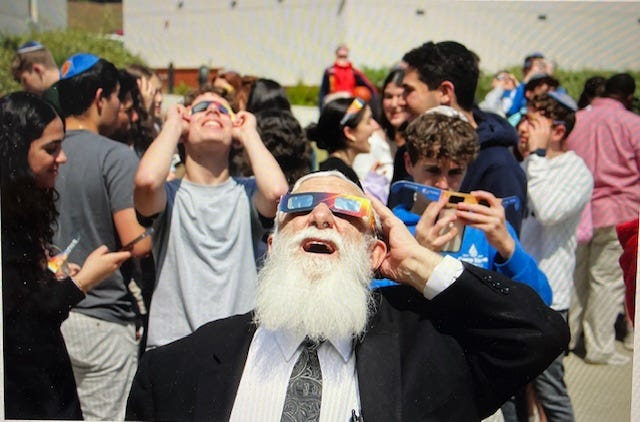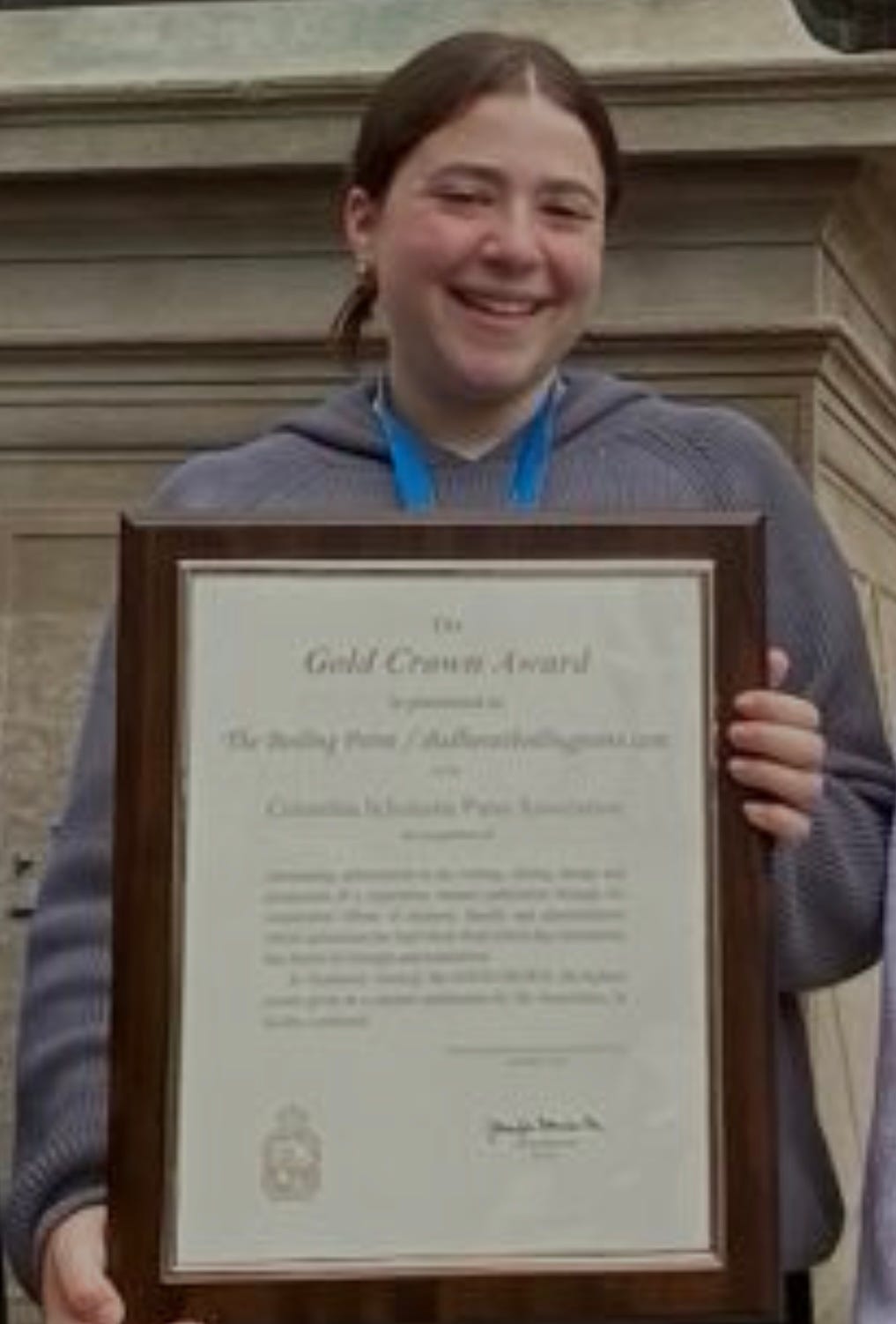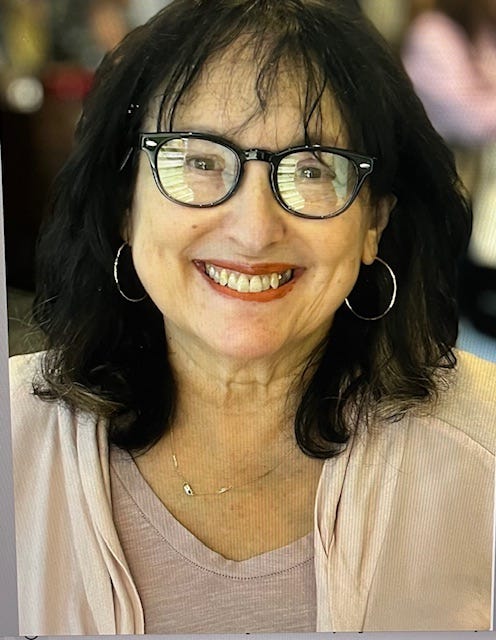Meet The Next Generation Of Jewish Journalists
The need to engage young people – starting with teens – who understand and can explain the complex issues facing American and Israeli Jews has never been greater….Join a live Zoom discussion June 17.
‘The Eclipse’s Spell’: This photo by Oliver Mason, editor of Palette, the Atlanta Jewish Academy’s high school newspaper, won first place in this year’s Jewish Scholastic Press Association competition in the category of photojournalism. It accompanied Mason’s essay on ancient Jewish interpretation of eclipses as bad omens.
An editorial directed at a Jewish audience, published two months after October 7, 2023, cited the tenets of the Torah in cautioning the Jewish community not to lose sight of the humanity of non-combatant Gazans. “If the IDF can make an earnest attempt to distinguish between Hamas terrorists and Palestinian civilians – even when their enemy hides missiles under the beds of innocent children – we, as Jews representing our homeland across the world, have a responsibility to do the same.
“It’s also not only our homeland we represent,” the editorial continued. “It’s our Jewish values and the Torah that should guide our lives and actions.” The writer called on readers “to view Palestinian lives and the Palestinian experience through the lens” of the biblical command to treat all people as created “b’tzelem elokim, in God’s image.”
It concluded: “Jews, innocent Palestinian civilians, and the entire world have the same enemy in this war: Hamas. It’s only when we can unite around the value of human life and the value of each other’s experiences that we will have the power to defeat that force once and for all.”
On reading the editorial, I was impressed with its clarity, confidence and empathetic message, especially since it was written by a teenage student in her high school newspaper.
Titled “Hamas vs. Humanity,” the piece was written by Tali Liebenthal, a gifted writer who served for two years as co-editor-in-chief of The Boiling Point, the student newspaper of Shalhevet, a Modern Orthodox high school in Los Angeles, widely heralded as a national leader in high school journalism. The editorial was credited with helping to resolve a divide within the editorial board of the paper over its position on the Mideast conflict.
First in the nation: Tali Liebenthal, editor of the Shalhevet high school’s Boiling Point, holds The Gold Crown Award, the highest national award for a high school newspaper given by the Columbia Scholastic Press Association. The Boiling Point has won the award 12 times.
Now an incoming sophomore in the Columbia University and List College Dual Degree Program, studying American Studies and Talmud, Liebenthal says that writing for The Boiling Point all four years of high school “was one of the most enriching and rewarding experiences of my life. It shaped me as a person and changed the way I see and engage with the world around me.”
Across the country, in Atlanta, Georgia, Oliver Mason, a graduate this month from the Atlanta Jewish Academy (AJA) who was editor-in-chief of Palette, the school newspaper, inspired many of his fellow students and the local community with a moving piece he wrote last year in memory of Dekel Swissa, 23. The only commander on the IDF base near Kibbutz Be’eri the morning of October 7, he was killed after saving a number of soldiers in his charge.
The Atlanta Jewish community had a special connection to Swissa, who served as an Israeli teen emissary there in 2018-2019, and had close ties with the Jewish schools. In his memory, the 9th and 10th grade girls classes at AJA displayed facets of his life as part of an exhibit they produced, called The Dekel Project. Based on interviews with Swissa’s father and brother, who visited Atlanta, the students “transformed a classroom into important locations from Dekel’s life such as his bedroom, boardroom, and yeshiva,” Mason observed, “and visitors experienced them while AJA students shared details about him. The project aimed to share his stories, legacy, and wisdom with members of AJA’s community.”
Mason said that was one of the most meaningful stories he wrote during his four years on the staff of Palette, noting that though he never met Swissa, “I grew inspired by his life story and clear values through conversations with his American host family” and many others who knew him. Mason added that since October 7, every issue of Palette covers Israel in some way, and he feels that “this new dimension of reporting also strengthened my personal connection to Israel.”
Motivating others: Oliver Mason, editor of Palette, the Atlanta Jewish Academy’s high school newspaper, speaking at a Jewish Scholastic Press Association conference session on strategies in encouraging imagination in story choices..
‘Who Will Tell Our Story?”
Our community needs more young, award-winning journalists like Tali Liebenthal and Oliver Mason. They will join me and journalist/educator Joelle Keene, the most influential and successful advocate of student journalism in U.S. Jewish high schools, for a live Zoom discussion next Tuesday, June 17 at 7 pm ET on the challenges, rewards and future of the field. (See details below)
At a critical moment for an American Jewish community deeply concerned about Israel’s fate and the deadly anti-Semitism at home, there is worry that many younger Jews have become more distant from communal engagement and the Zionist cause. And with it all, there is growing frustration over biased media reporting on these issues. “Who will tell our story?” many of us wonder. Will the next generation understand, appreciate and convey the fact that Western values of ethics, justice and human dignity are rooted in sacred Jewish texts? Can it make the moral and historical case for Israel in an increasingly hostile world? Will future Jewish journalists – whether they report from within or outside the community – follow the Torah’s one-sentence paradigm for the ethical journalist?
It can be found in Leviticus ch. 19 v. 16, which states: “You shall not be a gossip-monger among your people; you shall not stand aside while your fellow’s blood is shed; I am the Lord.”
I wrote a column 20 years ago on the subject of Jewish journalists dealing with the biblical prohibition against lashon hara (evil speech), and noted that the two phrases in the Leviticus passage suggest two different lessons – “a warning and an obligation. On the one hand we are commanded not to spread gossip because it demeans neighbors in ways they cannot counter. It has the power to destroy through character assassination. But the balance of the verse warns us not to shrink from responsibility. If we deem the circumstances important enough, we are obligated to take a stand, speak out and help correct an injustice. The verse concludes ‘I am the Lord,’ reminding us that if we can write with both accuracy and compassion, our task can take on a measure of holiness.”
Setting high standards: Joelle Keene, journalist, educator and founder of the Jewish Scholastic Press Association, whose goal is to ‘bring professionalism and Jewish values to high school journalism.’
Joelle Keene has been driving that message home to Jewish high school journalists for more than two decades, encouraging them to view their rigorous practice of journalism through a lens of Jewish ethics. A graduate of Columbia’s Journalism School with a decade of experience as a professional daily journalist, Keene served as faculty advisor of The Boiling Point at Shalhevet from 2003 to 2024. During her tenure the paper won scores of national awards in all phases of reporting, photography, multimedia, podcasts, graphics and design. (The Boiling Point is the only student member of the American Jewish Press Association, a national organization of Jewish newspapers and journalists, and has won awards in direct competition with Jewish community newspapers.)
Keene is now devoting full-time to her work as president and founding executive director of the Jewish Scholastic Press Association (JSPA), a non-profit she launched in 2013 to “bring professionalism and Jewish values to high school journalism.” (Full disclosure: I have been a member of the board since its inception and a judge in its annual journalism competition.) Keene started the program when the timing of several national high school journalism conferences interfered with Shabbat, making it unable for her to bring her students to participate. Keene hoped to attract journalists from Jewish day schools by holding a Shabbat-friendly annual conference and offer other programming with a distinctly Jewish component in its approach.
She soon discovered that Shalhevet’s active, independent school newspaper she advised was a rarity among Jewish day schools in the U.S. She recruited a handful of schools around the country to sign up for the fledgling JSPA. The organization grew slowly. Over the years, though, Keene’s persistence in contacting and establishing relationships with Jewish high schools, has succeeded. About 20 Jewish high schools have become JSPA members, sending students to its conferences and workshops, and participating in its annual journalism competition. Keene believes that just as extra-curricular programs from basketball to chess to debate teams have become common in such schools over the years, quality student newspapers can and should, too.
But one of the reasons some day school administrators are less than eager to host quality school newspapers is that they are not keen on students probing into various school policies and areas of tension. And in truth, there are, inevitably, challenges for student journalists – and administrators – in even the most welcoming school environments. Tali Liebenthal acknowledged that “many of the most difficult moments I faced at The Boiling Point had to do with press freedom and our identity as a paper connected to a Modern Orthodox Jewish high school. Even when our reporting met the highest journalistic standards,” she said, “we often found ourselves caught between our commitment to good journalism and the expectations of the religious community we were writing within.”
When Journalistic Principles Clash With School Principals
A powerful example of that tension resulted in the Grand Prize-winning article in this year’s JSPA-sponsored competition. It was a Boiling Point report on why an earlier staff-written interview with several local Muslim teens was censored by the Shalhevet principal, who said the paper crossed a red line by “giving pro-Palestinians a platform for misinformation and hate.”
Liebenthal, as editor of the paper, defended the article by pointing out that The Boiling Point had posted many articles describing its students’ and alums’ deep support for and involvement in Israel’s war effort, and that “if we’re going to come out of this stronger and fight for Israel, and fight for our right to have a state, and fight against all the people who think that we’re wrong, we need to understand that side.”
The JSPA judges, including me, credited the winning article for “mak[ing] strong points on all sides without bias, and display[ing] deep understanding of the role journalism can play within an academic environment.”
(Ironically, in winning the award for an article about the school banning a controversial piece, the heated issue received another round of public attention.)
Oliver Mason of The Palette faced less dramatic tensions but noted that in dealing with school administrators at AJA, “I struggled to produce objective stories that were not overly approving nor unnecessarily critical of the school or its leaders. We recognized that however objective we would like to be, our newspaper reflects on our school and that many of the most interesting stories to our student body involve grievances or issues with school administrators.”
Encourage Our Youth To Speak Up
Delicate situations, however stressful, are important for student journalists to confront because they provide life-experience training for careers not only in journalism but in any field where idealistic employees come up against issues, or individuals, seen as off limits. In decades of editing community Jewish newspapers, first in Baltimore and more recently in New York, I often found myself navigating between journalistic independence and communal pressures. Producing newsworthy stories can force the community to look at itself in the mirror – and so it requires being sensitive to the limits the community can tolerate at that moment. Progress is incremental, trust is built slowly, and the question is not whether to do the story but how.
At The Jewish Week, we found success in reaching young people by offering them opportunities to speak in their own voices, first through Fresh Ink, a section of the newspaper – and later online – written for and by high school students on a wide range of topics of their choice. And for more than two decades Write On For Israel, our intense two-year Israel education program -- through journalism -- helped prepare more than 800 high school students for the challenges of the campus experience. (Sadly, it is needed more than ever now.)
Today, at a time when few teens even read the news, JSPA is encouraging young journalists like Tali Liebenthal and Oliver Mason, and scores of their peers around the country, to gain experience motivating fellow students to join them on the school newspaper staff, learning which issues are vital to cover within and beyond the school, how to present the information in an engaging way, and maintaining trustworthy relations with the administration and the wider community. Those qualities have all the makings of not only a fine editor but a first-rate leader.
My charge to the next generation of potential Jewish journalists brings me back to the first column I wrote as editor and publisher of The Jewish Week. The message, written in 1993, on the role of a Jewish newspaper, remains the same today. It concluded: “The general journalist knows the answer to ‘if not me, who?’ is ‘somebody else.’ The Jewish journalist knows that there is no one else. And he or she serves a community that deserves, and requires, better.
“That can make Jewish journalism far more than a job; that can make it a calling.”
PLEASE JOIN US NEXT TUESDAY EVENING…
I welcome each of you to join Oliver Mason, Tali Liebenthal, Joelle Keene and me next Tuesday, June 17, 7 pm ET on a live Zoom as we discuss their journalistic experiences and dreams, what Tali and Oliver think older American Jews need to know about the younger generation, and more. Paid subscribers will receive a Zoom link in the next 24 hours to participate in the program; there is no need to register. Free subscribers who wish to participate in this and future live Zoom conversations can upgrade to paid – $36 a year – by clicking HERE).







